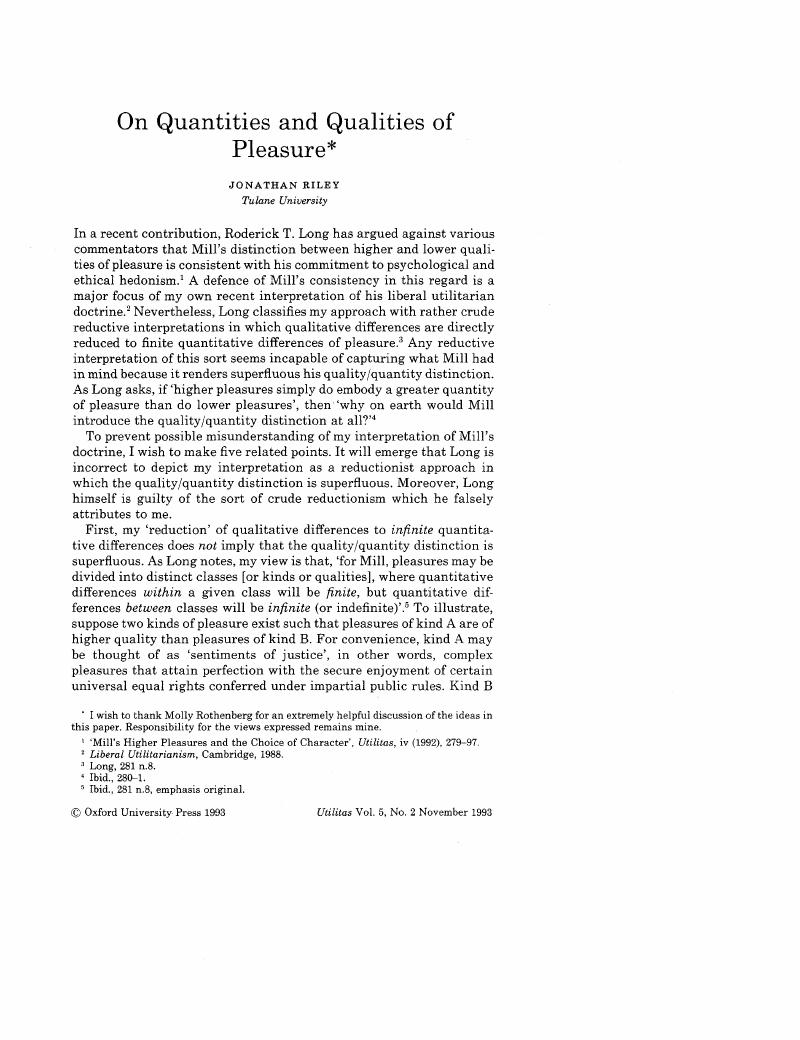Article contents
On Quantities and Qualities of Pleasure*
Published online by Cambridge University Press: 26 January 2009
Abstract

- Type
- Discussion
- Information
- Copyright
- Copyright © Cambridge University Press 1993
Footnotes
I wish to thank Molly Rothenberg for an extremely helpful discussion of the ideas in this paper. Responsibility for the views expressed remains mine.
References
1 ‘Mill's Higher Pleasures and the Choice of Character’, Utilitas, iv (1992), 279–97.CrossRefGoogle Scholar
2 Liberal Utilitarianism, Cambridge, 1988.Google Scholar
3 Long, , 281 n.8.Google Scholar
4 Ibid., 280–1.
5 Ibid., 281 n.8, emphasis original.
6 If we are confined to purely ordinal measure, different amounts of pleasure of kind A may be ordered or ranked in terms of more or less without reference to finite numbers of units.
7 Note also that one unit of pleasure of kind B cannot be reduced to any finite number of units of pleasure of kind A, however small. The former pleasure is qualitatively inferior to the latter pleasure. This is consistent with an assertion that one unit of the lower pleasure may be ‘reduced’ to a vanishingly small or infinitesimal quantity of the higher pleasure, in short, zero units of the latter.
8 If hedonism is abandoned in favor of a value-pluralist framework, however, then a quality/quantity distinction might be defended in ways other than the two possibilities mentioned in the text. See, for example, the distinction between happiness and pleasure drawn by Berger, Fred, Happiness, Justice and Freedom: The Moral and Political Philosophy of J. S. Mill, Berkeley, 1984Google Scholar. But, as Long argues convincingly (281–4), Berger's revisionism entails significant departures from what Mill himself had in mind.
9 ‘Utilitarianism’, Essays on Ethics, Religion and Society, ed. Robson, John M., Toronto, 1969Google Scholar, Collected Works of John Stuart Mill, x. 211Google Scholar (and henceforth as ‘Utilitarianism’, CW, x. 211).Google Scholar
10 Diary entry, 23 March 1854; in Journals and Debating Speeches, ed. Robson, John M., 2 vols., Toronto, 1988Google Scholar, CW, xxvii. 663Google Scholar. Quoted with emphasis by Long, , 280.Google Scholar
11 Long, , 281 n.8.Google Scholar
12 ‘Utilitarianism’, CW, x. 213.Google Scholar
13 Ibid., 251, emphasis added.
14 See Riley, , ‘A Liberal Utilitarian Theory of Justice’, to be published as a monograph.Google Scholar
15 Technically, if cardinal measure and interpersonal comparisons of utility are deemed inadmissible so that the only feasible utility information consists of interpersonally noncomparable ordinal rankings, then the usual Benthamite aggregation procedure reduces to simple majority rule. See, for example, Riley, , ‘Utilitarian Ethics and Democratic Government’, Ethics, c (1990), 335–48CrossRefGoogle Scholar. In my view, there is good reason to think that Mill subscribed to pure ordinalism. See Riley, , ‘A Liberal Utilitarian Theory of Justice’, ch. 4.Google Scholar
16 For further discussion of the liberal utilitarian calculus which I attribute to Mill, see Riley, , Liberal Utilitarianism, esp. chs. 5, 6 and 9Google Scholar; and Riley, , ‘A Liberal Utilitarian Theory of Justice’, ch. 4.Google Scholar
17 A Theory of Justice, Cambridge, Mass., 1971, pp. 42–3, n.23.Google Scholar
18 Ibid., pp. 122–6, 315–25. According to Rawls: ‘[M]ixed conceptions … are denned by substituting the standard of utility and other criteria for the second principle [of justice as fairness]… [They] accept the first principle [of justice as fairness], and therefore recognize the primary place of the equal liberties. None of these views is utilitarian, for even if the principle of utility is substituted for the second principle, or for some part of it, say the difference principle, the conception of utility still has a subordinate place’ (pp. 315–16).
20 Long, , 279, emphasis original.Google Scholar
21 Ibid., 285, emphasis original.
22 Long does not tell us how to define or individuate a ‘character’ or ‘mode of life’ in a hedonist context. In particular, he is silent about the relationship (causal or otherwise) between a character and any set of particular pleasures. For Mill, a character is evidently a set of dispositions or habits of willing. How are these habits formed? Evidently by repeated acts of will. But what motivates any particular act of will prior to the formation of habits? Some strongest present desire itself ultimately caused by some pleasure associated inseparably with the properties of some object or thing. This is the basic chain of character formation or causation posited for explanatory purposes by psychological hedonism. For convenience, I will say that the particular pleasures that ultimately motivate the dispositions comprising any character are pleasures ‘underlying’ or ‘embedded’ within the character, even though the dispositions involve habitual activities and thus may have become divorced from the pleasant feelings that originally motivated the activities. As Mill tells us, acts of will may through repetition eventually come to be divorced in our consciousness from the pleasures that first give rise to the acts (‘Utilitarianism’, CW, x. 238–9Google Scholar). For further discussion of the details, see also Riley, , Liberal Utilitarianism, ch. 7Google Scholar; and Riley, , ‘A Liberal Utilitarian Theory of Justice’, ch. 4.Google Scholar
23 I say ‘at best’ irrelevant because it may also be confusing to use the term ‘quality’ in this way. It is surely odd to speak of the same particular pleasure (for example, the pleasure of respecting the rights of others) varying in ‘quality’ across the different characters in which it is embedded, taking on a higher or lower quality as characters themselves become more or less pleasurable. The pleasure of respecting rights is itself of higher quality than mere ‘animal pleasures’.
24 Long, , 296–7, emphasis original.Google Scholar
25 See Riley, , Liberal UtilitarianismGoogle Scholar; and ‘A Liberal Utilitarian Theory of Justice’.
- 18
- Cited by


